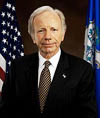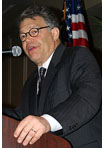|
Barak and Mitchell issue vague
statement after NYC meeting
  NEW YORK (Press Release)—Following is a joint press release issued by Israel's Defense Minister Ehud Barak (at left) and U.S. Special Envoy George Mitchell (a right) following their meeting yesterday in New York. NEW YORK (Press Release)—Following is a joint press release issued by Israel's Defense Minister Ehud Barak (at left) and U.S. Special Envoy George Mitchell (a right) following their meeting yesterday in New York.
"Defense Minister Barak and Special Envoy Mitchell met for several hours in New York on June 30. They discussed the full range of issues related to Middle East peace and security and the contributions Israelis, Palestinians, their neighbors and the international community should make to this effort.
Specifically, their discussions covered a wide range of measures needed to create a climate conducive to peace. These included measures on security and incitement by the Palestinians; steps by Arab states toward normalization with Israel; and, from Israel, actions including on access and movement in the West Bank and on settlement activity. The discussions were constructive and will continue soon."
Prior to this statement, U.S. State Department spokesman Ian Kelly held a press briefing in Washington, D.C. at which the meeting came up. A transcript of that session follows.
State Department spokesman says U.S. not putting time limits on Israel-Palestinian negotiations
WASHINGTON, D.C. (Press Release) -- Following are excerpts from the briefing on Tuesday by U.S. State Department spokesman Ian Kelly. The briefing concluded at 1:14 p.m.
QUESTION: The meeting between (U.S. Special Envoy George) Mitchell and (Israel's Defense Minister Ehud) Barak --
MR. KELLY: Yeah.
QUESTION: -- this morning in New York. Do you have a readout?
MR. KELLY: As I understand it, the meeting is either still going on, or at least when I came down here, it was still going on. I was able to talk to one of his aides up in New York. He told me the discussions so far have been good and constructive, that this is part of our ongoing dialogue, Senator Mitchell’s ongoing efforts to get negotiations started, but that we don’t expect any dramatic agreement today.
QUESTION: And do you expect a statement or something at the end of this meeting?
MR. KELLY: That – I mean, that’ll be something for them to work out, whether they do a statement at all or they do a joint statement. I’m not sure. As I say, it’s still – as far as I know it’s still going on.
QUESTION: At least a readout from the American --
MR. KELLY: We’ll, see if we can get you a readout.
QUESTION: Yeah, okay.
MR. KELLY: Yeah, I think you had a question, so --
QUESTION: She covered it.
MR. KELLY: Covered it, good. Okay.
***
QUESTION: And if I may get back to just one. Ehud Barak (inaudible), as you may have read, is reportedly offering a three-month settlement freeze while Secretary Clinton and President Obama have called for a full stop to all kind of settlement activity, full stop.
MR. KELLY: Yeah.
QUESTION: How would you react to that proposal? It doesn’t sound like you’re really being heard in Israel.
MR. KELLY: Yeah. Well, what we’re doing right now, or what Senator Mitchell is doing, is working very hard to create the conditions that will enable both sides to resume negotiations. And you’ve heard me say many times from this podium that we believe that all parties have to meet their obligations under the Roadmap. And of course, you know for the Israelis, that means a stop to settlements, which means a freeze of all activity, including natural growth. The Palestinians have their own obligations under the Roadmap, and that’s stopping incitement and proving that they can improve security. We also have made it clear to Arab states in the region that they should take steps towards normalization.
As far as any kind of time limits, I think we’re not – we’re not interested in setting any kind of time limits before negotiations have even begun. And as you’ve also heard me say many times from this podium, we don’t really want to negotiate from the podium. We don’t want to negotiate via the media.
Jill.
QUESTION: Sorry. Can I clarify that?
MR. KELLY: Yeah.
QUESTION: What does that mean, “before negotiations have begun”? Does that mean before the Israelis and Palestinians talk about it they should be working on timelines, or before you and the --
MR. KELLY: Yeah, I just – what we want to do is get the parties to sit down, and I just don’t think it’s really fruitful for us to talk about any kind of time limit to those negotiations.
QUESTION: (Inaudible) there was a freeze of three months – the negotiations –
MR. KELLY: Well, like I say --
QUESTION: -- they have three months --
MR. KELLY: I just – I’m not going to get into the details --
QUESTION: Yeah, but that’s what you are relating to? That’s --
MR. KELLY: Well, no, I’m talking about the negotiations themselves – a time limit, a start point and an end point. I don’t think it’s useful for us to talk about.
QUESTION: It sounds like you’re getting out of this argument and for the longest time it’s between you – between the U.S. and Israel, and the criticism has been that it should be between the Israelis and the Palestinians, and it sounds like you’re trying to back out of that argument.
MR. KELLY: Well, I mean, this is what we want. We want the two sides to sit down. We want to get to a point where we have the kind of conditions where they can sit down and start talking.
QUESTION: A follow-up, please?
MR. KELLY: Yeah.
QUESTION: But if the Israelis agree to a three-month or a six-months freeze on settlement activity, all settlement activity, doesn't that give you a six-months window to try to get the peace process started? Would that be an acceptable compromise for you?
MR. KELLY: I’m not – as I say, I’m not going to negotiate from here, and I’m definitely not going to answer a question that begins “if.”
U.S., Israel joint economic group discuss Israel's budget process
WASHINGTON, D.C. (Press Release) —Delegations of the United States and Israel held useful, in-depth discussions on the progress of Israel's economic reforms and the Israeli economy during the annual meeting on Monday of the U.S.-Israel Joint Economic Development Group (JEDG).
The U.S. delegation was led by Andy Baukol, Acting Assistant Secretary of the Treasury for International Affairs, and David D. Nelson, Acting Assistant Secretary of State for Economic, Energy and Business Affairs. The Israeli delegation was led by Yarom Ariav, Director General of the Israeli Ministry of Finance. Representatives from the Bank of Israel also participated.
At the outset of the meeting, Director General Ariav presented an overview of the Israeli economy and discussed recent economic developments. Additional topics discussed during the course of the meeting included fiscal policy and lessons learned from U.S. and Israeli budgetary management processes.
The U.S. delegation commended Israel's strong economic performance and fiscal discipline in recent years. Both countries' delegations agreed to terms and conditions that will govern the U.S. Government's decision to make available FY 2010 and FY 2011 tranches of loan guarantees for use by Israel, subject to statutory deductions. Included in the conditions are the fiscal targets and structural reforms specified by the Ministry of Finance in Israel's 2009-2010 budget, which is currently under review in the Knesset.
The delegations reaffirmed their commitment to monitor progress on economic reform and fiscal restraint through annual meetings of the JEDG.
The U.S. Fiscal Year (FY) 2003 Wartime Supplemental Appropriations Act authorized $9 billion in loan guarantees be made available to Israel over time, subject to deductions. A 2006 Amendment extended this program until September 30, 2011, allowing unused amounts to carry over until 2012. The U.S. Israel Loan Guarantee Commitment Agreement (LGCA) sets forth the terms and conditions for issuing guarantees in exchange for meeting specific economic conditions set forth each year at the JEDG. U.S. FY 2010 and 2011 loan guarantee tranches of $333.3 million each year could be made available to the Government of Israel provided that Israel meets the requisite conditions, subject to statutory deductions.
Lieberman anticipates Senate passage of clean energy bill
 WASHINGTON, DC (Press Release)-- Senator Joe Lieberman (Independent-Connecticut) on Monday issued the following statement in response to the House of Representative's passage of climate change legislation: WASHINGTON, DC (Press Release)-- Senator Joe Lieberman (Independent-Connecticut) on Monday issued the following statement in response to the House of Representative's passage of climate change legislation:
"The House took a historic step forward by passing climate change legislation last week and I look forward to working to pass similar legislation in the Senate. Climate change legislation will help drive our economy forward by creating sustainable clean energy jobs without driving up our power costs. However, the slim margin by which the House passed this historic bill underscores the need for a broad, bipartisan coalition as it heads to the Senate - one I am working hard to help build. Last year, we made progress in the Senate on climate change and now with the support of President Obama
Go to top of right column
|
|
and the momentum from the House vote, I am convinced the time has come for Congress to adopt a bill and for it to be signed into law."
Minnesota Supreme Court declares Franken is U.S. senator
 MINNEAPOLIS, Minnesota—The Minnesota Supreme Court on Tuesday issued a unanimous 32-page decision that former comedian Al Franken, a Democrat, won last November's race for the U.S. Senate, defeating incumbent Republican Norm Coleman. Here is a link to that decision. MINNEAPOLIS, Minnesota—The Minnesota Supreme Court on Tuesday issued a unanimous 32-page decision that former comedian Al Franken, a Democrat, won last November's race for the U.S. Senate, defeating incumbent Republican Norm Coleman. Here is a link to that decision.
President Barack Obama issued a statement saying ""I look forward to working with Senator-Elect Franken to build a new foundation for growth and prosperity by lowering health care costs and investing in the kind of clean energy jobs and industries that will help America lead in the 21st century."
With Independents Joseph Lieberman of Connecticut and Bernie Sanders of Vermont both caucusing with the Democrats, and with Arlen Specter of Pennsylvania having recently switched from the Republican to the Democratic party, Democrats in the Senate now have 60 votes, enough to vote to end any filibuster by Republicans.
Anti-Defamation League hails Supreme Court's discrimination decision in Ricci v. DeStefano
NEW YORK (Press Release)—The Anti-Defamation League (ADL) on Monday welcomed the Supreme Court's 5-4 decision in Ricci v. DeStefano, in which the court held that white firefighters in New Haven, Connecticut were unfairly denied promotions because of their race.
ADL submitted a friend-of-the-court brief in the case, urging the court to require the strictest of reasons for the city's race-conscious decision. The League argued the city's decision to ignore the results because it feared being sued had to be supported by a "strong basis in evidence." These arguments were adopted by the court.
Glen S. Lewy, ADL National Chair, and Abraham H. Foxman, ADL National Director issued the following statement:
The Supreme Court's decision in Ricci v. DeStefano is a welcome reaffirmation that the government must have a strong basis in evidence to support any race-based decision.
This decision properly forecloses many instances of governmental race-based decision making, particularly those where government unilaterally seeks to correct what it sees as racial injustice for one group while unfairly burdening another.
We are pleased that in making its decision, the Court clearly reaffirmed the central role of Title VII of the Civil Rights Act, a fundamental law that ensures that America's workplaces will remain free of racial discrimination and that an employee's race will never be a barrier to opportunity.
We are pleased that the arguments in our brief were substantially adopted by the court. Unfortunately, however, the court did not go one step further to give New Haven an opportunity to justify its position in light of the new "strong basis in evidence" standard.
The promotional exam involved in Ricci was intended to determine who would be promoted to certain officer positions in the department. When the results of the exam were tallied, it was apparent that mainly white firefighters would be immediately promoted as a result. Instead of certifying the exam and promoting the firefighters, the city threw out the exam, claiming that it would be subject to a lawsuit by African-American fire fighters. The white firefighters sued, claiming racial discrimination
ADL's 95-year history is marked by a commitment to protecting the civil rights of all persons, whether they are members of a minority group or of a non-minority group, and to assuring that each person receives equal treatment under the law. Although great progress has been made in the area of civil rights, the work is certainly not complete and discrimination and inequality persist.
The League's brief was authored by Michael Smith and Martin Karlinsky of the law firm Butzel Long.
**
 In Washington D.C., meanwhile, Senator Arlen Specter (Democrat, Pennsylvania.) on MOnday commented on the Supreme Court’s decision in Ricci v. DeStefano: In Washington D.C., meanwhile, Senator Arlen Specter (Democrat, Pennsylvania.) on MOnday commented on the Supreme Court’s decision in Ricci v. DeStefano:
“The 5-4 decision by the Supreme Court in Ricci v. DeStefano is a confirmation that the ruling could have gone either way and the Second Circuit judgment, including Judge Sotomayor’s, has plenty of company with the four dissenting Justices.”
Wyden legislation would ease transition to civilian life for National Guard combat veterans
 PORTLAND, Oregon (Press Release) – Keeping a promise he made to help National Guard soldiers adjust to life after combat, Senator Ron Wyden on Monday unveiled a package of legislation that includes a 90-day “soft landing” for troops returning from Iraq and Afghanistan. PORTLAND, Oregon (Press Release) – Keeping a promise he made to help National Guard soldiers adjust to life after combat, Senator Ron Wyden on Monday unveiled a package of legislation that includes a 90-day “soft landing” for troops returning from Iraq and Afghanistan.
“One of the hard lessons we have learned from years of war in Iraq and Afghanistan is that we weren't ready to respond to the modern challenges facing National Guard soldiers, their families, our wounded soldiers, or our veterans,” Wyden said. "Guard soldiers dodge the same bullets as active-duty soldiers, and they all deserve an equal, higher level of care when they return home.”
The "National Guard and Reserve Soft Landing Reintegration Act" is part of a package of bills Wyden is introducing to help soldiers, their families and veterans. The other bills will allow families to spend more time with returning or deploying soldiers, allow soldiers wounded in combat to remain in the military if they choose, improve mental health services for veterans, and increase accountability and public information for veterans' health care.
“These men and women have sacrificed a lot for their country, and we are just going to have to do a better job of helping them re-adjust to civilian life,” added Wyden.
The package of bills includes:
"The National Guard and Reserve Soft Landing Reintegration Act of 2009" will ensure that returning service members have a firm safety net when they return from war. By allowing them to remain on active duty for up to 90 days, collect pay, and access reintegration services, this legislation will help ease the adjustment from combat to civilian life. Currently Guard and Reserve troops have only a few days to readjust before returning to civilian life.
"The Military Family Leave Act of 2009" would give immediate family members (spouse, children and parents) of deploying soldiers up to two weeks un-paid time off to spend together before and after the deployment. Employers would not be allowed to penalize immediate family members taking time off to ease the transition of a deploying soldier. Currently, a patchwork of leave programs requires larger business to give time off to some family members. The Military Family Leave Act would apply to all businesses and part time employees as well as full time employees.
"The Wounded Warrior Retention Act of 2009" will allow service members who wish to remain on active duty after suffering injuries or disabilities as a result of combat, an act of terrorism, military training or other duty-related activities to do so. Currently, some well trained and productive soldiers are forced out because of injuries, despite their ability to still contribute to the military.
"The Servicemembers Mental Health Care Commission Act of 2009" recognizes that the scars of war can be mental as well as physical. This act will form a commission to study and identify the most effective treatments available to those who are experiencing problems as well as the stigmas and barriers that stand in the way of servicemembers seeking care.
"The Department of Veterans Affairs Hospital Quality Report Card Act of 2009" will ensure that data regarding the quality of care administered by the nation’s veteran’s hospitals is readily available to the public in the form of a semiannual report card. This initiative will allow patients to compare the quality of healthcare provided by Veterans Affairs facilities.
Boxer lauds the release of hazardous coal-ash site list
 WASHINGTON, D.C. (Press Release) --U.S. Senator Barbara Boxer (Democrat, California), Chairman of the Senate Committee on Environment and Public Works, on Monday made the following remarks following the public release of a list of 44 coal-ash waste sites in 10 states that have been identified as presenting a “high hazard.” WASHINGTON, D.C. (Press Release) --U.S. Senator Barbara Boxer (Democrat, California), Chairman of the Senate Committee on Environment and Public Works, on Monday made the following remarks following the public release of a list of 44 coal-ash waste sites in 10 states that have been identified as presenting a “high hazard.”
A “high hazard” rating means that a coal ash site is located in such a way that if it were to fail, it would pose a threat to human life. The 10 states represented on the list are Arizona, Georgia, Ohio, Illinois, Indiana, Kentucky, Montana, North Carolina, Pennsylvania, and West Virginia.
Senator Boxer said: “I want to commend the Obama Administration for releasing the list of high hazard coal ash waste sites, given the critical importance of the public’s right to know about threats in their communities. I called on the Administration to release the list of these high hazard sites so that people have the information they need to quickly press for action to make these sites safer. One of the lessons we all learned from the TVA coal ash spill is that a close look at these waste sites is extremely important. The Environment and Public Works Committee will continue its investigation of these coal ash waste impoundments, and as part of our oversight, I plan to conduct additional hearings on this issue.”
In the aftermath of the December 22, 2008 coal ash spill in Kingston, Tennessee, the Senate Environment and Public Works Committee immediately held an oversight hearing to better understand the incident and how to avoid similar disasters in the future. When EPA Administrator Lisa Jackson came before the EPW Committee for her confirmation hearing on January 14, 2009, she committed to move immediately to address the threat posed by coal ash waste across the country.
Since then, the U.S. Environmental Protection Agency (EPA) has been conducting an assessment of the status of coal combustion waste storage facilities nationwide. To date, EPA has identified hundreds of coal ash waste facilities, including 44 sites classified as “high hazard.” Coal combustion waste is subject to very limited regulation – in fact, there are stronger protections for household garbage than for coal ash waste. These sites can contain dangerous toxins, including arsenic, selenium, cadmium and chromium, among others.
|
|

